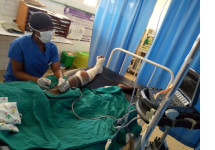Maryanne Abanobi, MD:
Rwanda: August 2018

During August 2018, I traveled to Kigali, Rwanda to provide nerve blocks for surgical anesthesia and postoperative analgesia for patients undergoing upper and lower extremity surgeries. Upon entering the operating theater, there were several notable differences between the hospitals in the United States and the University Central Hospital of Kigali (CHUK). From rundown operating rooms with broken glass windows on the doors to anesthesia machines without end tidal CO2 monitoring to medication shortages, it was very apparent the resources available to provide care to the underserved families in Rwanda were limited.
My purpose for going to Rwanda was to utilize my training as a regional anesthesia and acute pain medicine fellow to not only provide improved pain control for patients, but also teach the anesthesia residents and attendings how to perform nerve blocks so they can continue to provide blocks after my departure. Because the primary mode of transportation is by motorcycle, many of the trauma patients presenting for surgery had injuries caused by motorcycle accidents. Fractures of the femur, tibia, and fibula were frequently seen and patients often went to the wards after surgery in excruciating pain with only NSAIDS and paracetamol available for relief. It was rewarding to perform femoral and sciatic nerve blocks and observe the tension release from their bodies as their pain resolved. We also saw several children with ulna, radius and supracondylar humerus fractures and performed supraclavicular nerve blocks after they were placed under general anesthesia. Seeing them comfortable in the recovery room reassured me that service we provide is valuable.
This trip gave me a greater appreciation for the privilege I have being able to train in the United States and motivates me to continue traveling to underserved areas to provide care for those less fortunate.